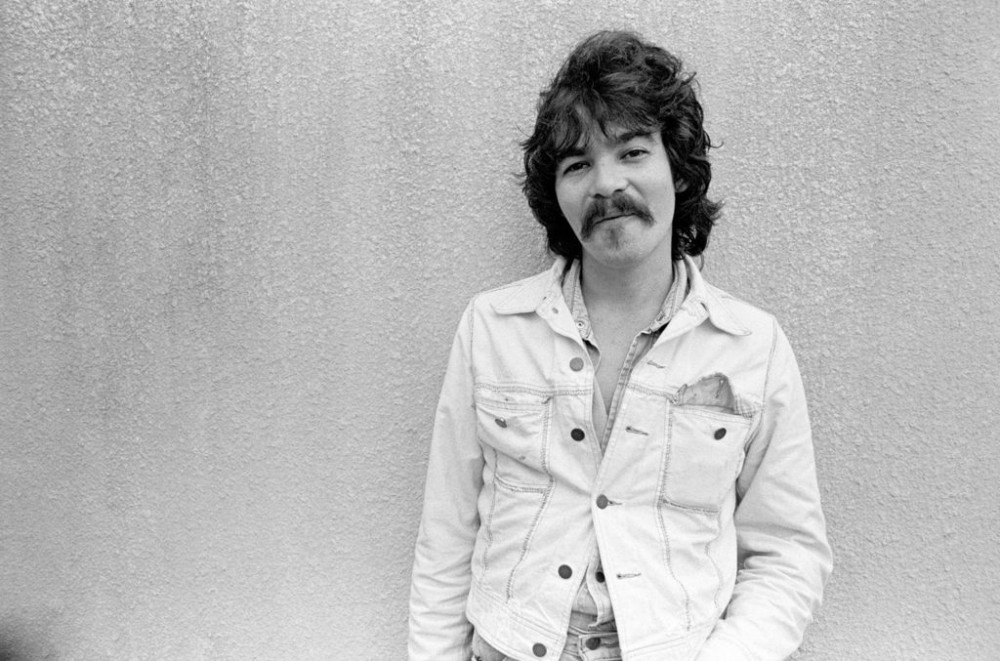John Prine wrote country-folk songs with an unpretentious, aw-heck demeanor that belied their astonishing gravity and power. “He sings rather quietly, and his guitar work is good, but he doesn’t show off,” Roger Ebert wrote of an early Prine show in 1970. “After a song or two, even the drunks in the room begin to listen to his lyrics. And then he has you.”
That night’s setlist at the Fifth Peg in Chicago included “Spanish Pipedream,” “Angel From Montgomery” and “Sam Stone” — three of Prine’s most cherished songs, which he would perform for the rest of his life. About his new fanbase in his third act, “It took some of ‘em 45 years to get the joke!” Prine cracked to CBS News in 2018. “And some people are getting it now. And I’m still around to reap the benefits.”
Changing music industry tides certainly affected Prine; as he once sang, you’re up one day, the next you’re down. But Americana’s goofy, sage uncle went out on top. Years after beating squamous cell cancer in his neck in 1998 and lung cancer in 2013, Prine died Tuesday (April 7) due to complications from coronavirus. He was 73.
While his 1970 debut album John Prine contains the lion’s share of his classic songs, his entire career contains precious gems — from 1973’s brash Sweet Revenge to 1978’s embattled Bruised Orange to his funny, solemn 2018 swan song The Tree of Forgiveness. Whether you’re feeling crazy as a loon or like everything is cool, there’s a winking, grinning Prine tune for every dimension of the human experience.
To mark the songwriting legend’s untimely death, here are his five most essential albums — along with five deeper choices from his body of work.
ESSENTIAL ALBUMS
John Prine (1971)
In 1966, Prine was drafted into the military — not in Vietnam, but in West Germany, where he whiled away the billable hours “drinking beer and pretending to fix trucks.” When he returned to his hometown of Maywood, Ill., he wrote two antiwar songs while working as a mailman: “Sam Stone,” about a rattled veteran with a heroin problem, and “Your Flag Decal Won’t Get You Into Heaven Anymore,” a ruthless send-up of mindless jingoism. Out of those grew Prine’s classic self-titled debut album, in which he took deeply unhip subjects — like middle-aged Southern housewives (“Angel From Montgomery”), the destruction of bucolic Kentucky farmland (“Paradise”) and the loneliness of senior citizens (“Hello in There”) — and mined them for maximum poignancy.
Sweet Revenge (1973)
Despite the strength of material on John Prine, the songwriter was audibly nervous while recording it, which stymied some of the cuts. His defiant third album Sweet Revenge, the cover of which features Prine putting up his s–t-kickers in a Porsche convertible, corrected the stiffness issue. By 1973, Prine was a far more magnetic singer, which makes Sweet Revenge a breezier listen than his debut. “Please Don’t Bury Me” pokes fun at Prine’s physique as he wills his body parts postmortem, “Dear Abby” is a list of increasingly bizarre letters to the titular advice column, and “Grandpa Was a Carpenter” is a warm, detailed portrait of an old-school patriarch.
Bruised Orange (1978)
When Prine was 15, he had a life-altering experience while shoveling snow for the Episcopal Church of the Holy Communion in Maywood. “I heard a bunch o’ sirens over on the North Western tracks,” he said in the special John Prine Live On Soundstage 1980. “Some kid had been walkin’ along, I guess his head was just in a cloud, kinda daydreamin’, and a train hit him.”
This tragic scene inspired “Bruised Orange (Chain of Sorrow),” about that doomed altar boy — and despite the presence of lighthearted cuts “Fish and Whistle” and “Aw Heck,” its sense of desolation flows into every corner of Bruised Orange. This includes the hangdog Phil Spector co-write “If You Don’t Want My Love,” the surreal show-business lullaby “Sabu Visits the Twin Cities Alone,” and the sublime “That’s the Way The World Goes ‘Round,” which is the right prescription for anyone under the boot of temporary adversity.
The Missing Years (1991)
The Gospels describe in detail Jesus’s childhood and ministry, but the in-between remains a question mark. Luckily, Prine threw Biblical scholars a bone with “Jesus, the Missing Years,” the sorta-title-track to this great late-period album. “He discovered the Beatles and he recorded with the Stones,” he reveals in a talking-blues interlude. “Once, he even opened up a three-way package for old George Jones.”
Prine had earned this casual cheek; both middle age and mature production a la Tom Petty’s Wildflowers (Petty and most of the Heartbreakers appear on the album) suited him. Elsewhere, Prine, who was seemingly born middle-aged, wears endearing dad jams “Daddy’s Little Pumpkin” and “It’s a Goofy Old World” well, and “All the Best,” about picking up the pieces from the wrecked marriage, is simple, elegant, and unforgettable. “Having recently acquired my second divorce, the song truck pulled up and dumped a bunch of great songs on my lawn,” Prine explained on the show Route 90 in 1990 as he introduced the song.
The Tree of Forgiveness (2018)
Prine named his final album partly after an Irish restaurant he visited called The Tree of Idleness. (“A fancy name for being lazy,” Prine, a self-proclaimed loafer, told The Guardian in 2018.) Changing a word but failing to adapt it into a song, Prine inserted it in “When I Get to Heaven” as the name of the watering hole in Shangri-La. “If] all these people that are all such Christians are gonna be there,” he deadpanned to The Guardian, “you’re going to need a drink.”
The rest of The Tree of Forgiveness swings between silliness and solemnity, from “Egg and Daughter Nite, Lincoln Nebraska, 1967 (Crazy Bone),” a hysterical rag about poor impulse control, to “Caravan of Fools,” a grim warning about running with a bad crowd. The album’s standout is “Summer’s End,” a sweet, sunlit ballad that sums up The Tree of Forgiveness’s preoccupation with mortality and goodbyes.
LESSER-KNOWN GEMS
Diamonds in the Rough (1972)
Prine arguably shot his shot on his masterpiece-packed debut, leaving his second album, Diamonds in the Rough, sometimes viewed as a sophomore slump. This is partly due to the production — unwilling to “dress the songs] up like they were on the first album,” Prine recorded live with minimal Appalachian backing as if he were playing to the barstools at the Bitter End, and the result comes off as more rushed than raw.
Get past the sound, though, and Diamonds in the Rough features similarly great ingredients as John Prine: “Souvenirs” is a gleaming ode to sentimental objects; “The Late John Garfield Blues,” true to the doomed actor in its title, is evocative of rainy streets and dashed dreams; and “The Great Compromise” blurs the line between romantic and patriotic indignation as his date gets with another guy at the drive-in.
Common Sense (1975)
After the bolder step of Sweet Revenge, Prine opted to take his image as a streetwise ‘70s rocker even further. “I’d kind of run the gamut with writing either ballads or even thinking about putting a character in a song,” he told journalist William Ruhlmann. Recording at Ardent Studios with members of the Memphis Horns and Booker T. and the MGs, Prine and producer Steve Cropper crafted its follow-up, Common Sense, as an excursion into slickly produced barroom blues, and it ended up Prine’s most poorly received album to that point. Still, top-notch highlights “Come Back to Us Barbara Lewis Hare Krishna Beauregard” (a dry send-up of aging hippies worthy of Steely Dan) and “He Was in Heaven Before He Died” (an elegiac sequel of sorts to “Paradise”) prove Common Sense is far from senseless.
German Afternoons (1986)
If Diamonds in the Rough is too unpolished and Common Sense suffers the opposite problem, German Afternoons splits the difference between the two nicely. Mixing a strong bluegrass feel with solid production sheen, the album tosses up Prine originals with covers of the Carter Family (“Lulu Walls”) and Leon Payne (“They’ll Never Take Her Love From Me”) to winning ends. While the album is far from perfect — “Out of Love,” a love song full of domestic beer slogans, is a particular head-scratcher — the infectious novelty song “Let’s Talk Dirty in Hawaiian” and a string-band version of “Paradise,” which by 1986 had been widely covered by bluegrass acts, make German Afternoons one of Prine’s stronger late-period albums.
Lost Dogs + Mixed Blessings (1995)
“If I had to pick one song of Prine’s], it might be ‘Lake Marie,’” Bob Dylan told The Huffington Post in 2009. “I don’t remember which album that’s on.” His remark rings true in both respects: That song, a novel-rich hallucination that constellates a gruesome murder, a struggling marriage, and (er) a sausage cookout, remains one of Prine’s most idiosyncratic deep cuts — while the album it’s on, Lost Dogs + Mixed Blessings, has somewhat faded from the conversation. “Lake Marie” is this uneven album’s center of gravity, but there are other idiosyncratic Prine gems to savor here: “Day is Done” details the arc of a relationship with the economy of Randy Newman’s “Love Story,” and “Humidity Built the Snowman” describes it evaporating the most cheesy metaphor available.
Fair & Square (2005)
By the end of Lost Dogs + Mixed Blessings’ lengthy recording process, Prine and producer Howie Epstein of the Heartbreakers were “pretty tired of each other. At the end of it, we shook hands and said ‘OK, we did it,’” Prine later said in the 2015 biography John Prine: In Spite of Himself. In 2005, two years after Epstein’s death, Prine was anxious to reclaim what they achieved together. “He got such a big sound on me,” he glowed to journalist Jeremy Tepper. “So I was real careful trying to get a good sound on this, and I think we did it.” Featuring solid, mellow material like “Glory of True Love,” “Some Humans Ain’t Human” and “Clay Pigeons” and some of his best late-period production, Fair & Square is middle-of-the-road Prine in the best way possible.



